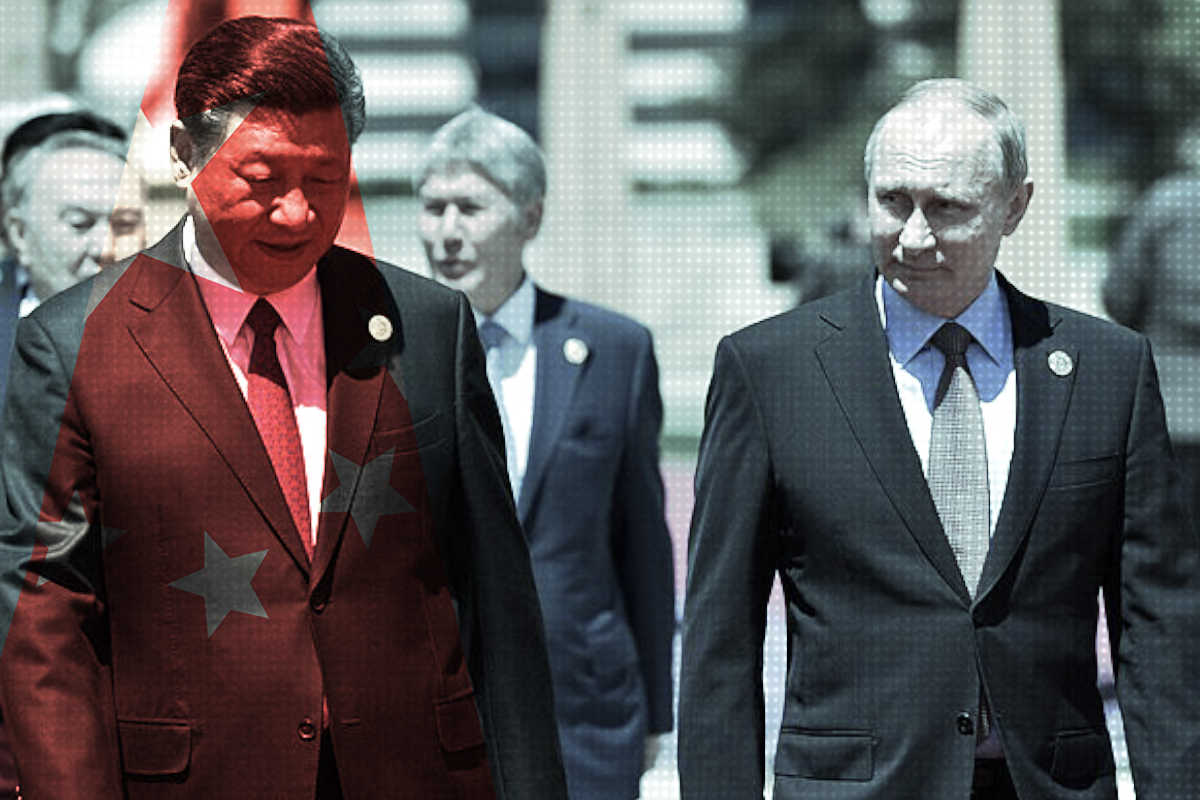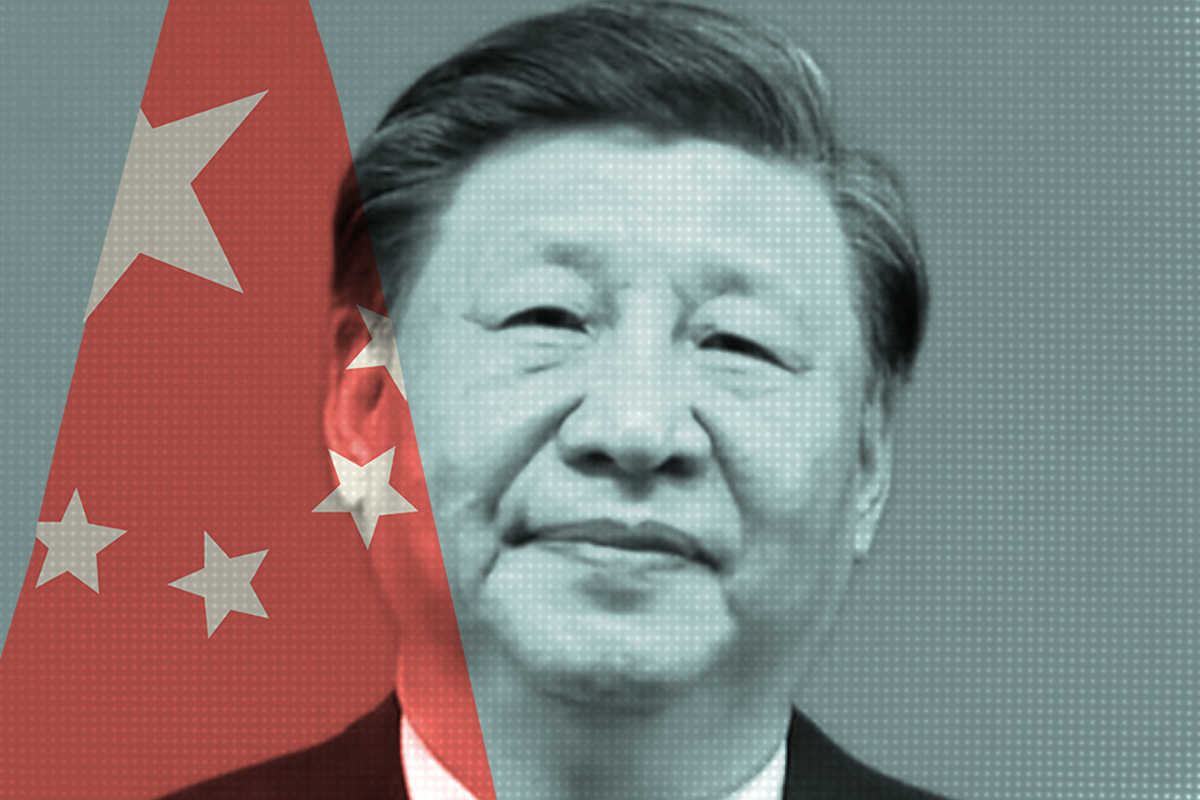
There have been continued moves by Chinese internet authorities in recent months to assert control over digital platforms – restraining their commercial appetites and moral failings as well as their political/ideological impact. This has affected not just the handling of big data, but a wide range of social and cultural activities as well, from fandoms to online gaming.
Setting the tone for what would become a broad crackdown on the country’s internet sector, Cyberspace Administration of China (CAC) chief Xu Lin (徐麟) said late last year of the application of big data and new technologies to the economy and society: “[We must] resolutely prevent the weakening of the Party’s leadership in the name of integrated development, and must resolutely prevent the risk of capital manipulating public opinion.”
One focus of concern for the authorities has been restraining the role of influencers, or wanghong (网红), the mostly young internet personalities who have drawn large followings. And since last month, one group of wanghong in particular has drawn fire from Party-state media outlets, held out as an example of the corrupting influence of commercialism online.
Meet China’s “Buddhist beauties.”
The term “Buddhist beauty,” or foyuan (佛媛), is a more recent addition to the online lexicon in China, applied to online influencers who pose themselves in Buddhist contexts, surrounded by Buddhist objects and rituals. They depict themselves lighting incense, studying the sutras, performing ritual bows, or eating in Buddhist vegetarian restaurants. They often appear delicate and demure in these spiritual settings, but their environments are often salted with commercial brands and products.
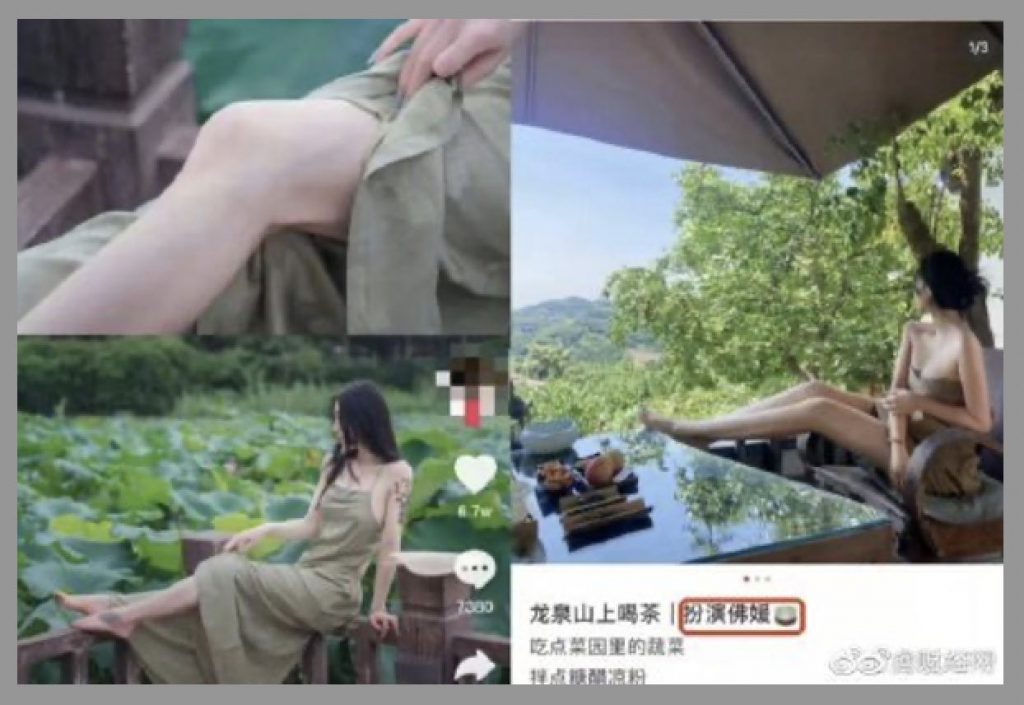
In the current internet policy atmosphere, where moral finger-pointing about civilizational responsibility has become de rigueur, and where state media and regulators seem always on the hunt for the next violator, it was perhaps only a matter of time before such acts drew greater scrutiny. The state media backlash kicked off in late September, as the Worker’s Daily, the official newspaper of All-China Federation of Trade Unions, published an article criticizing Buddhist beauties for capitalizing on religion. The paper specifically targeted female online influencers who proclaimed Buddhist lifestyles.
According to the Worker’s Daily, foyuan are vain and materialistic attention seekers. The article begins with a sneering description of a day in the life of one foyuan as she appeared recently online. The day begins with a fancy breakfast at her “grand residence” (豪宅), followed by a meditation done quietly as a luxury handbag waits by her side. Like many Buddhist beauties she wears a kasaya, the robe generally worn by fully ordained Buddhist monks and nuns. But her kasaya is custom tailored to accentuate her curves, and as she drives off to temple in her sports car her naked thigh is teased into the open. All of this is shared on video, to be consumed by millions.
The paper depicted the commercial behavior of the Buddhist beauty generally, the promotion of cosmetics, apparel, dietary supplements and so on, as an unforgivable sin against Buddhism. “I can’t help but think of these women as those nine-tailed fox monsters from [the classic] Journey to the West,” the author wrote. “Can the fox’s tail really be hidden behind a kasaya?”
The article concluded: “In short, the time has come to bring the farce of the ‘Buddhist beauties’ to an end. And I hope even more that the word ‘fashionable woman’ can soon regain its beautiful original sense.”
The reference here to the “fashionable woman,” or mingyuan (名媛), clues us in to the origins of the term foyuan. Popular since the 1930s in China, this term has generally referred to a woman who belongs to a well-known family and can often be seen in style and fashion circles. In a more contemporary sense, mingyuan can refer to famous and wealthy people in fashion and society (including internet society). The mingyuan, then, is the fashionable woman with Buddhist sensibilities. Another possible translation of foyuan could be “Buddhist socialite.”
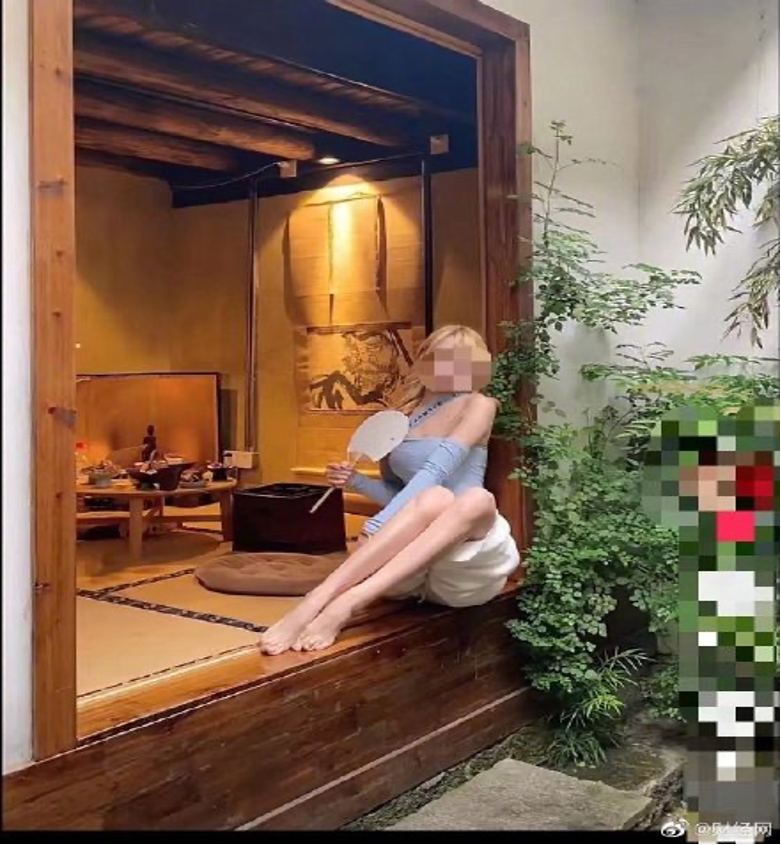
When the Worker’s Daily spoke of the need to bring the “farce” of the Buddhist beauties to an end, this was clearly not just a moral judgement and a call for internet users to spurn such online content. It was a call for concrete action from internet platforms, implying that Buddhist beauties were somehow in violation of laws and regulations. The headline of the article also made this clear: “”In Governing the Chaos of Buddha Beauties, Platforms Must Be Clear About Their Responsibilities” (治理佛媛乱象,平台要明确用户责任).
The fit of pique towards Buddhist beauties on the internet continued on September 24, as the Southern Metropolis Daily, a commercial spin-off of Guangdong’s official Nanfang Daily, wrote that social media platforms should be responsible in censoring and regulating materialistic content from foyuan. And the paper revealed that some action had already been taken to curb the trend, reporting that 48 related accounts on Douyin (抖音), China’s domestic version of TikTok, had been fined, and seven accounts had been permanently deleted. In addition, some 148 online videos related to Buddhist beauties and their business promotions had been forcibly deleted. The Southern Metropolis Daily also accused Buddhist beauties of violating regulations in seeking to capitalize on Buddhism to sell their products. Specifically, it cited the Regulation on Religious Affairs.
But not all of those swept up in the growing maelstrom against Buddhist beauties have been silent about their predicament. When one female influencer was labelled a foyuan and singled out for criticism by “Feng Wen Community” (风闻社区), an account on Weibo that typically mirrors content posted to Shanghai’s Guancha News (观察者网), she accused the account of using her images without consent and fabricating a story about her exploitation of Buddhism to sell products.
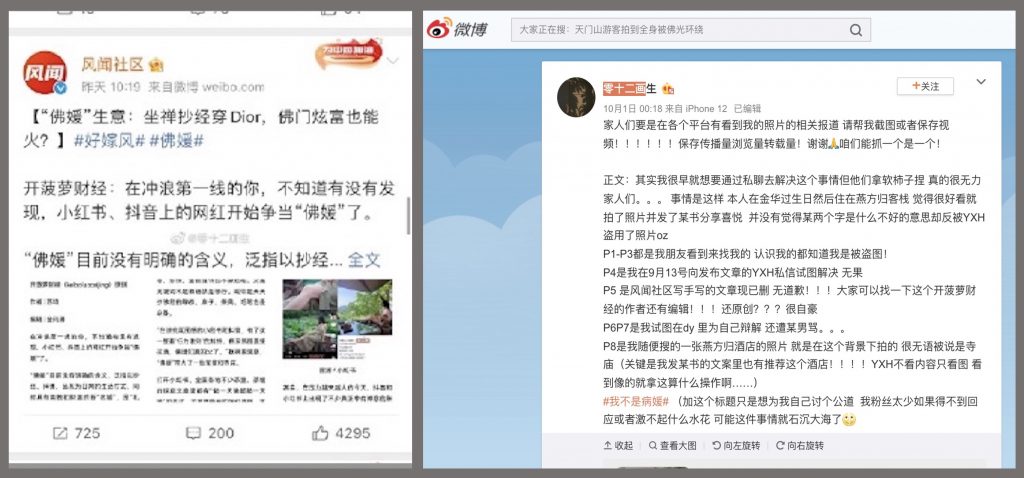
Shortly after the influencer spoke out against the social media attack on her reputation, the original post from “Feng Wen Community” disappeared.
Other Chinese netizens responded to the newly toxic attitude toward female foyuan by pointing out an obvious discrepancy. While Buddhist beauties were being singled out in the Party-state media and on social media for supposedly spoiling the spirit of Buddhism, everyone seemed to be turning a blind eye to similar posts from male influencers. Clearly, they said, there was a strong whiff of misogyny in the building campaign against Buddhist beauties.
What about the Buddhist bros?
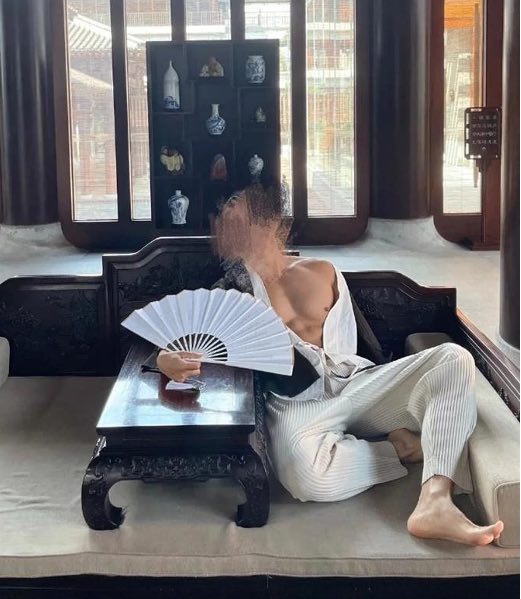
On September 24, the day after the Worker’s Daily article and the announcement from Douyin that it had disciplined more than 50 accounts related to the commercialization of Buddhism, Shanghai’s The Paper wrote concluded its criticism of the foyuan phenomenon with unmistakable moralizing over humanity, business and spiritual worth:
For these ‘Buddhist beauties,’ being ‘true to oneself’ means completing the transition from been a ‘socialite’ to being a human being, abandoning those misplaced illusions, steadily improving themselves, and making themselves worthy of those halos. Only then can they make clean money.
The moralism in the state media quickly extended from alleged Buddhist beauties to a new online slang term, so-called “sick beauties,” or bingyuan (病媛), singling out women who posed online seeking treatments and healthcare solutions.
On September 29, the People’s Daily reported on a post from the Xiaohongshu e-commerce platform, also known as “RED,” in which a female influencer claimed she had undergone thyroid surgery. A photo accompanying her post initially showed a scar on her neck, but the scar disappeared in subsequent images, and the influencer recommended use of a particular brand of scar removal patches and anti-scarring gel. The People’s Daily report speculated on whether or not the woman in question had actually need a procedure, centering on the elegance of her poses and the fact that she wore full makeup. Was she really ill, or was this just another way of promoting her business selling scar removal products?
While the People’s Daily report did not include images, the story was followed by Guancha News and the Health Times (健康时报), this time with images of the influencer taken from her account, and of other female influencers. The reports suggested that hospitals were sacred places where medical professionals were dedicated to saving lives, while these “sick beauties” showed disrespect for hospitals and patients alike by dressing up pretty and taking selfies in full makeup from their clinic beds.

These media attacks infuriated some influencers, and also drew criticism from many internet users. Zhang Jijing (张吉晶), the female influencer singled out in the Guancha News report, responded by filing a lawsuit against various news media that had used her images without permission, and had referred to her as a “sick beauty.”
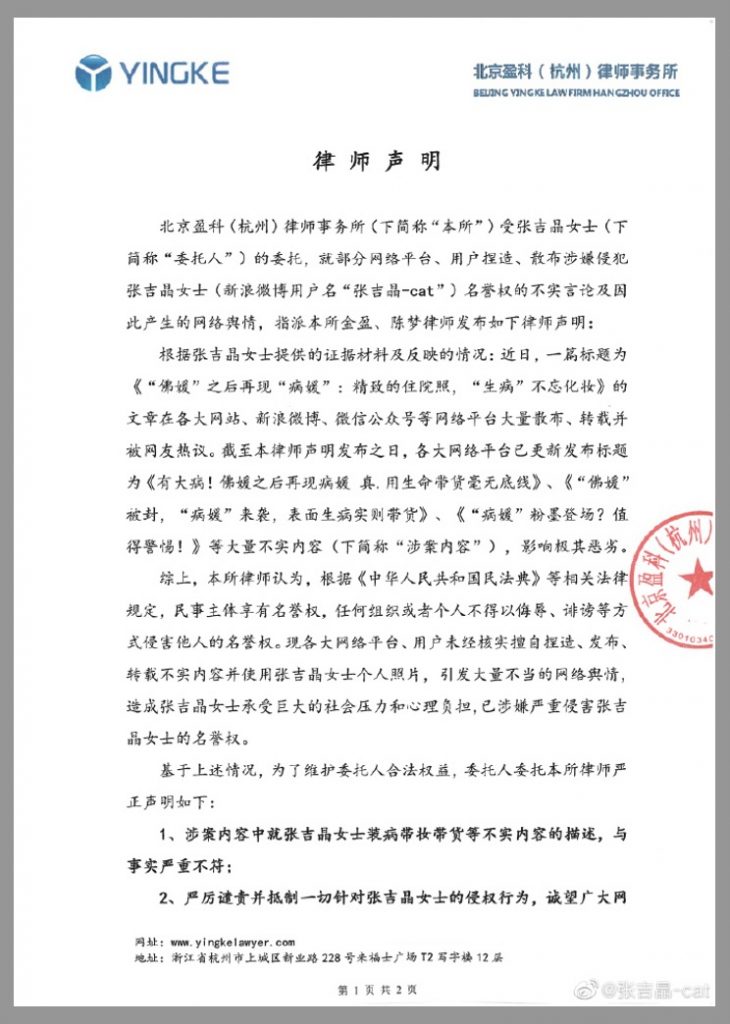
In another post that was quickly deleted from the internet, Zhang Jijing sought to clarify that she in fact was not selling scar removal products, and that her trip to the surgery had been authentic.
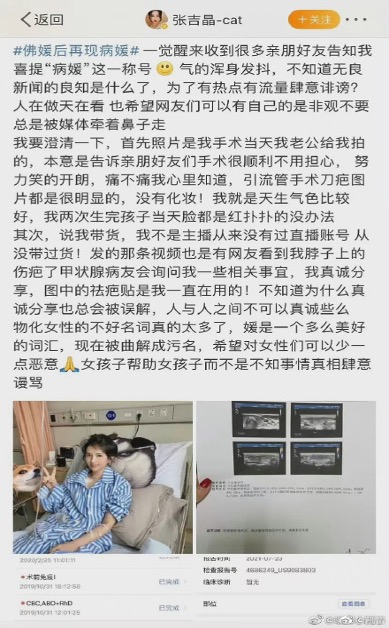
When another influencer highlighted in the report from the Health Times, which had also been republished at The Paper, contacted the latter to ask whether the outlet would issue an apology for its actions, she was rebuffed, told that they would not take responsibility for an article that had originated with the Health Times.
The influencer recorded the entire exchange, posting it to the Weibo platform. In the recording, the influencer can be heard saying: “You’re saying you won’t apologize, is that right?” To this, the employee at The Paper responds: “This article was written by the Health Times, and we here simply reposted it.”
Influencer: “So if The Paper reposts something, then it doesn’t need to take responsibility, is that right?”
The Paper: “That’s what you’re saying, not what I’m saying.”
Influencer: “I see. So let me ask, then. Will The Paper definitely not take any responsibility for this?”
The Paper: “Let me just tell you that regarding this report we’ve already followed up. The apology you want is impossible, but we will continue to follow up on the story.”
There is a great deal of talk these days about China’s internet and the need to regulate for greater responsibility. The broad accusations facing China’s so-called Buddhist beauties and “sick beauties,” however, are a cautionary tale about what happens when internet enforcement becomes rule by shame, an exercise in moral finger-pointing that can itself be devoid of responsibility.


















